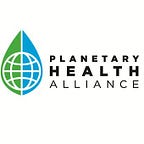Indigenous Populations In Latin America: Invisible During COVID-19 Response
Rosa von Borries, Planetary Health Campus Ambassador
This picture shows Julián, an indigenous man from the Achuar Nation of Ecuador. He has been fighting collectively to protect his community from the consequences of a new road entering the Achuar territory, as well as other threats such as deforestation.
This image illustrates how indigenous populations have to fight against the anthropogenic destruction of our planet, and how they are left behind during the COVID-19 response. It symbolises indigenous peoples’ lives, intimately connected to nature. However, this deep connection to nature also places them in a more vulnerable position. Indigenous populations often inhabit natural resource-rich areas: consequently, logging and mining pose key threats to their lives. These threats are the hidden products of large-scale economies, being prioritised over constitutional human rights.
The COVID-19 pandemic has shed light on the systemic inequalities of unequal access to health care and basic infrastructure that indigenous populations face. Systematic inequalities that are known to originate from many facets of colonialism and globalisation, and yet the needs of indigenous populations still remain absent from the consciousness of the majority of Western populations. Testing has been focused on urban areas and has not reached many indigenous territories. At the same time, many indigenous communities have decided to blockade their borders, in fear of large-scale infectious outbreaks. Systematic racism, discrimination and stigma further challenges the ability of these communities to develop trust with non-indigenous people.
Establishing an intercultural approach during the COVID-19 response is essential in order to respect indigenous peoples’ rights. The translation and dissemination of COVID-19 information in indigenous languages is vital. Indigenous peoples’ views should be included in the decisions of governments and health organisations. Any planned or ongoing evictions should be paused and reconsidered during the COVID-19 pandemic.
We can learn plenty from indigenous communities about how to collectively live more sustainably, witnessing the COVID-19 pandemic as a window of opportunity for change. Sumak kawsay or buen vivir describes a way of life that is community-centric, culturally sensitive and ecologically balanced. In this philosophical approach, formulated by indigenous organisations and inscribed in Ecuador’s and Bolivia’s constitutions, wellbeing is not defined on an individual scale but rather in the social context of a community. Harmony between human beings, and between human beings and nature is central. It inspires us to dream of alternatives that until now have been challenging to fulfil. Only by imagining other worlds, can we create change.
